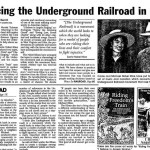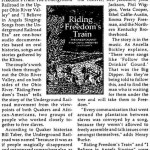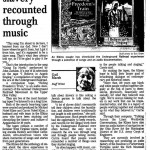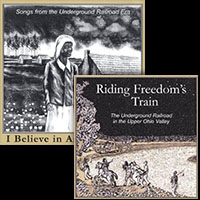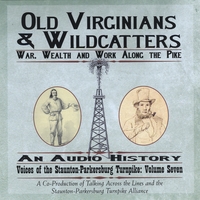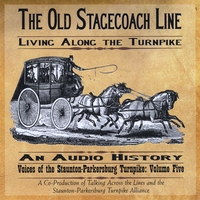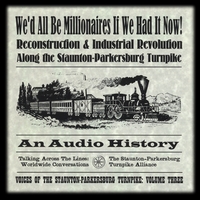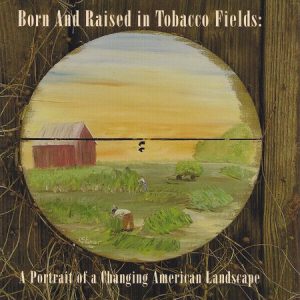I Believe in Angels Singing & Riding Freedom’s Train: 2 CD Set
$27.00
I Believe in Angels Singing is an anthology of twenty-five songs remembered from the era of the Underground Railroad, recorded at homes and churches in eastern Ohio and at the Augusta Heritage Center at Davis & Elkins College during the spring and summer of 1996. Partial support for field recording came from the Ohio River Border Initiative, a joint project of the Ohio Arts Council, the West Virginia Commission on the Arts and the National Endowment for the Arts.
As co-producers we were hopeful that such a compilation of music with images from the slave experience would provide a special vantage point from which to better understand events leading up to the American Civil War. The Underground Railroad is a profoundly important movement in United States history about which little has been written, though much is still remembered. We feel that, in this new millenium, this may be the most essential missing chapter of our nation’s history, because it suggests a model of how people struggled together across racial lines, risking lives and livelihood to oppose the unspeakable wrongs of slavery.
The title, I Believe in Angels Singing, is taken from the words of Neilda Pitts recollecting older people singing as they picked cotton in a large field near her childhood home. Sister Pitt’s performance of “Soon I Will Be Done with the Troubles of this World” opens the tape. Other performers include her mother, Bertha Tolliver, along with Ethel Caffie-Austin, John Jackson, Ken Jacobsen, Phil Wiggins, Emma Perry Freeman, Verta Cooper and the Northern Kentucky Brotherhood.
Our search for songs uncovered stories as well, and soon the research became grist for a racially mixed high school class on Narrative Arts. In the Spring of 1996 the Olney Friends School in Barnesville, Ohio, under the directorship of Ken and Katharine Jacobsen, embarked on a study of the Underground Railroad, exploring primary and secondary source documents relevant to the period. They brought us on, as a team of folklorists, to involve students in collecting spoken and sung testimonials, recording elderly Quakers and African-Americans as they related family stories and life histories to students and faculty.
These testimonies, delivered by candlelight, summoned what historian Tony Cohen terms “deep history,” the memories people carry through generations, sometimes unconsciously, until a song, an image, or a room full of eager listeners brings them to the surface. We wove together the recorded narratives and song fragments to create a one-hour audio documentary, Riding Freedom’s Train.
We have observed the dramatic impact of oral testimony on the learning process. Whether seeking out the stories of a particular historical movement, or just wanting to understand the nature of earlier life in our community, the past is brought to life through the words and images of those who lived it. Students of all ages are engaged by the true stories of those not usually involved in classroom study. Encourage students to enjoy the narrative arts by asking community members to school for a visit. Or better yet, send students out to interview community members in their own settings.
We are available for further consultation and in-class presentations.
